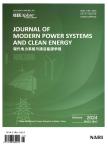Comparative Evaluation of Machine Learning Models and Input Feature Space for Non-intrusive Load Monitoring
Comparative Evaluation of Machine Learning Models and Input Feature Space for Non-intrusive Load Monitoring作者机构:Department of Electrical and Electronic EngineeringAuckland University of TechnologyAucklandNew Zealand Brice Valles ConsultingAucklandNew Zealand School of Engineering and TradesManukau Institute of TechnologyAucklandNew Zealand
出 版 物:《Journal of Modern Power Systems and Clean Energy》 (现代电力系统与清洁能源学报(英文))
年 卷 期:2021年第9卷第5期
页 面:1161-1171页
核心收录:
学科分类:12[管理学] 1201[管理学-管理科学与工程(可授管理学、工学学位)] 080802[工学-电力系统及其自动化] 0808[工学-电气工程] 081104[工学-模式识别与智能系统] 08[工学] 0835[工学-软件工程] 0811[工学-控制科学与工程] 0812[工学-计算机科学与技术(可授工学、理学学位)]
主 题:Machine learning model load feature non-intrusive load monitoring(NILM) comparative evaluation
摘 要:Recent advancement in computational capabilities has accelerated the research and development of non-intrusive load ***-intrusive load monitoring(NILM)offers many promising applications in the context of energy efficiency and *** classification is a key component of NILM that relies on different artificial intelligence techniques,e.g.,machine *** study employs different machine learning models for load classification and presents a comprehensive performance evaluation of the employed models along with their comparative ***,this study also analyzes the role of input feature space dimensionality in the context of classification *** the above purposes,an event-based NILM methodology is presented and comprehensive digital simulation studies are carried out on a low sampling real-world electricity load acquired from four different *** on the presented analysis,it is concluded that the presented methodology yields promising results and the employed machine learning models generalize well for the invisible diverse testing *** multi-layer perceptron learning model based on the neural network approach emerges as the most promising ***,it is also noted that it significantly facilitates the classification performance by reducing the input feature space dimensionality.



